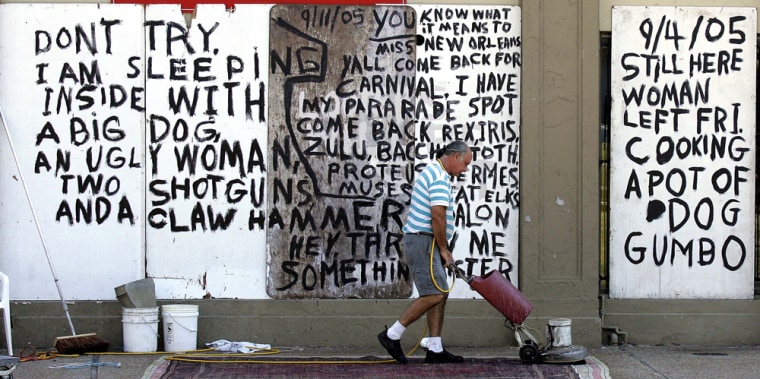The grimy residue of receded floodwater covered the blue Chevrolet pickup parked outside a shattered two-story house, but the offer spray-painted on the vehicle in white overflowed with enthusiasm:
“For Sale. Like New. Runs Great.”
The tongue-in-cheek sales pitch in this New Orleans suburb is evidence that Hurricanes Katrina and Rita didn’t necessarily destroy victims’ sense of humor, which is surfacing in signs painted on wrecked homes and on bumper stickers and inevitable T-shirts.
It jumps out from an Arabi auto glass shop: “Katrina was bad. The old lady and the dogs were more trouble.”
And from a refrigerator left on a French Quarter street: “Loot this!!!!”
The drink offerings at popular eatery Bacco’s now include “Katrina Rita,” “Cat 5 Hurricane,” and “Curfew & Coke.”
Elsewhere, bumper stickers and T-shirts are available with the saying “Make levees not war.”
Another T-shirt picks on a popular target: “Where is FEMA? Federal Employees Missing Again.”
“It’s been known for a long time one of the best coping mechanisms we have is humor,” said Kathryn Kirkhart, a clinical psychologist who has been working with evacuees in New Orleans. “It’s best used in situations where we have no control.”
But where’s the garage?
Some anonymous jokesters have chosen subtlety: “Garage Sale. Shoes. Games. Toys,” says a sign posted along a driveway that leads to a foundation where only the barest traces of the garage are still attached.
A house that floated off its foundation came to rest at the side of 38-year-old Philip Troxclair’s house. Another house is at the end of the driveway, decorated with the phrase “Wicked witch of the East was here.”
“Thank you Katrina,” deadpans a sign painted in blue on a hard-hit, one-level brick house.
Friday night in the French Quarter, a musician taking a break between songs at a restaurant blurted out: “We’re all trying here in New Orleans to get back to abnormal.”
